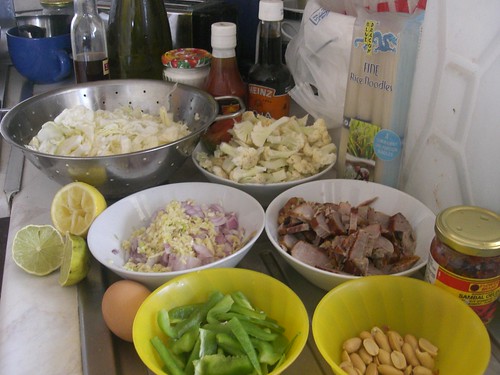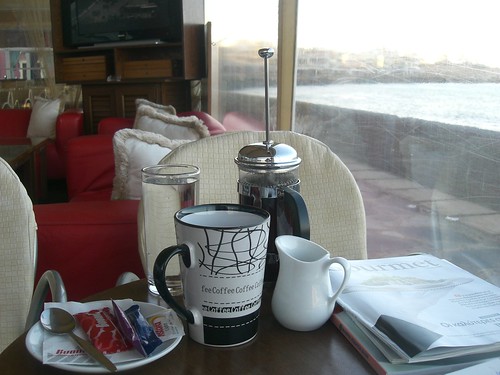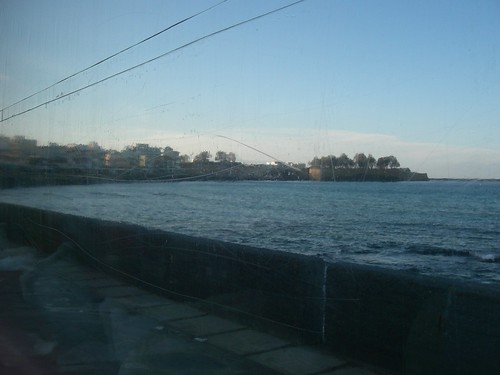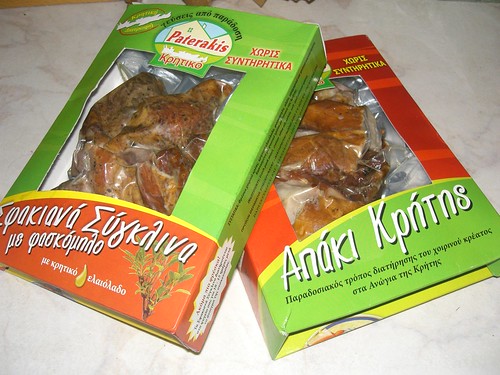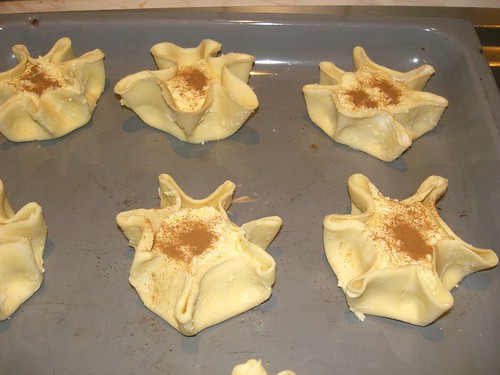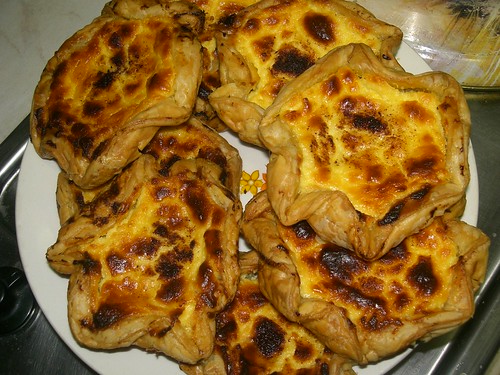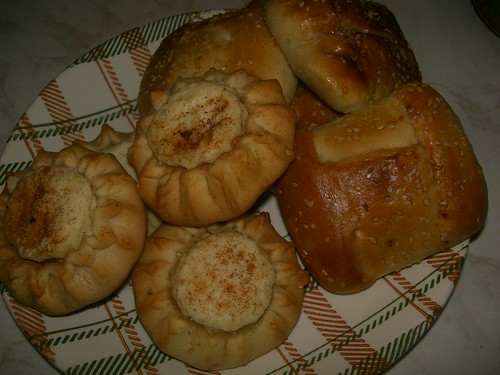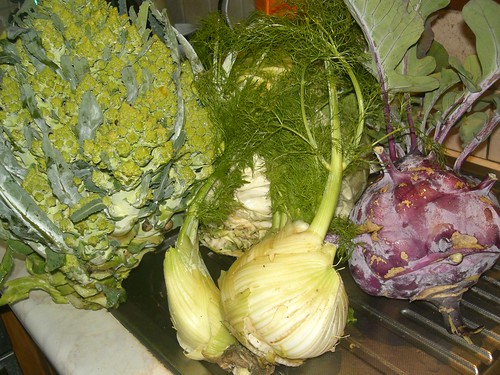
Calabrese, finnocchio, kohlrabi, all grown in Galatas, Hania. Only finnochio is sold in the stores; calabrese and kohlrabi are grown, but not sold.
Any ideas for cooked kohlrabi? I only use it raw.
Greek identity with a difference, from the inside out and the outside in (formerly Organically Cooked - Linking Greek food with Greek identity: you eat what you are, or who you want to be)
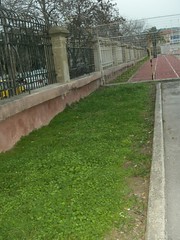
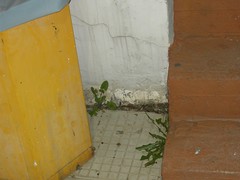
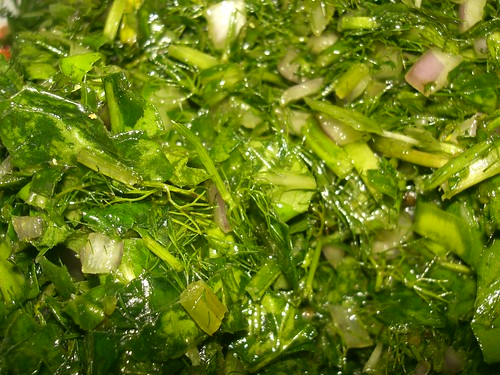
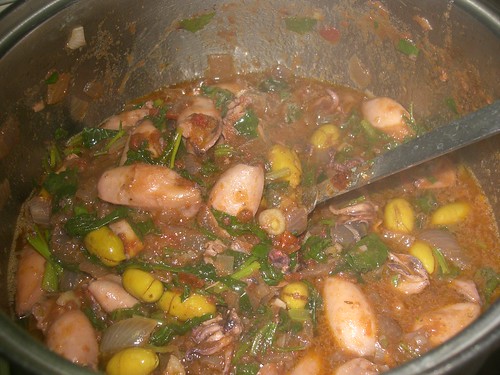
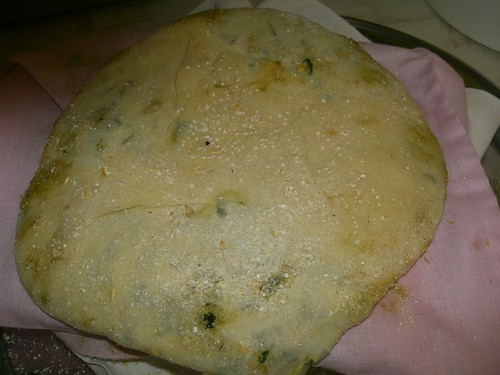
 100 years ago, no one knew where Macedonia was, but every one knew Constantinople. Now, you can choose the kind of Macedonia you want to go to (but not on a Greek map), whereas no one can go to Constantinople any more (you've got to go to Istanbul). Uskup was a relatively insignificant part of the Turkish empire. Now, with a slight change of name (Skopje), it's a relatively insignificant part of Europe. Greece was about as big as two Sicilies stuck one on top of each other, and it reached as far as Larissa. My beloved homeland was still considered part of the Turkish empire, but no one could decide on whether to call it Crete or Candia, despite the fact that it had in fact only just managed to free itself from hanging off the dingle-dangles of the Turkish empire in the previous year. News did not travel fast enough to the other side of the world in 1897.
100 years ago, no one knew where Macedonia was, but every one knew Constantinople. Now, you can choose the kind of Macedonia you want to go to (but not on a Greek map), whereas no one can go to Constantinople any more (you've got to go to Istanbul). Uskup was a relatively insignificant part of the Turkish empire. Now, with a slight change of name (Skopje), it's a relatively insignificant part of Europe. Greece was about as big as two Sicilies stuck one on top of each other, and it reached as far as Larissa. My beloved homeland was still considered part of the Turkish empire, but no one could decide on whether to call it Crete or Candia, despite the fact that it had in fact only just managed to free itself from hanging off the dingle-dangles of the Turkish empire in the previous year. News did not travel fast enough to the other side of the world in 1897. "But they says that's not necessary, because they wants to build its own pipeline running from Kazakhstan, whose resources they uses, running through Turkey, which would then pass it on to Greece. Which all means, of course, that if we decide to use gas from they's new proposed pipeline, we'd be hanging off both they's and Turkey's dingle-dangles. And they hopes we're going to agree. Paparia!"
"But they says that's not necessary, because they wants to build its own pipeline running from Kazakhstan, whose resources they uses, running through Turkey, which would then pass it on to Greece. Which all means, of course, that if we decide to use gas from they's new proposed pipeline, we'd be hanging off both they's and Turkey's dingle-dangles. And they hopes we're going to agree. Paparia!"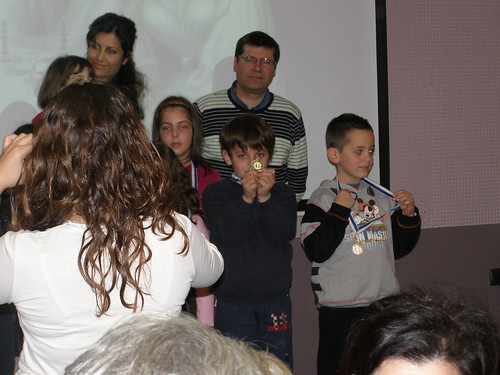
 The first politico to arrive was from the old school of politicians, Mr Skoulakis (a fellow blogger, would you believe). He has the classic Cretan looks with a thick moustache; he looks very much like my dad. His serious but homely manner reminds one of Venizelos, the famous Cretan politician who became the Prime Minister of Greece. Skoulakis entered the room like a gentleman who didn't need any introductions, taking it for granted that everyone knew him, and they did, because he's been in politics longer than I have been alive.
The first politico to arrive was from the old school of politicians, Mr Skoulakis (a fellow blogger, would you believe). He has the classic Cretan looks with a thick moustache; he looks very much like my dad. His serious but homely manner reminds one of Venizelos, the famous Cretan politician who became the Prime Minister of Greece. Skoulakis entered the room like a gentleman who didn't need any introductions, taking it for granted that everyone knew him, and they did, because he's been in politics longer than I have been alive. Next in was Mr Markoyiannakis. Why he's known better as Markoyiannis, without the Cretan name suffix -akis, as one would expect of a Cretan (have you ever noticed my own name?), might have something to do with his blond looks - he definitely doesn't look like my dad. He entered the room shiftily, his furtive gaze showing on his mafia-like fatsa as his eyes darted quickly from one side of the room to the other. He was flanked by two slight looking gentlemen who, despite their short stature, were probably undercover cops with pistols hidden in the right places to be brought out as needed. Mr Markoyiannakis never actually looked at anyone, just straight through them. The icing on the cake was when he excused himself for having to leave the event early. In his own words; "There are a lot of Vasilopites to cut this evening." Shucks man, that guy works so hard.
Next in was Mr Markoyiannakis. Why he's known better as Markoyiannis, without the Cretan name suffix -akis, as one would expect of a Cretan (have you ever noticed my own name?), might have something to do with his blond looks - he definitely doesn't look like my dad. He entered the room shiftily, his furtive gaze showing on his mafia-like fatsa as his eyes darted quickly from one side of the room to the other. He was flanked by two slight looking gentlemen who, despite their short stature, were probably undercover cops with pistols hidden in the right places to be brought out as needed. Mr Markoyiannakis never actually looked at anyone, just straight through them. The icing on the cake was when he excused himself for having to leave the event early. In his own words; "There are a lot of Vasilopites to cut this evening." Shucks man, that guy works so hard. Along comes Karagiozis in the form of Voloudakis. His eyes were large and bright, just like a college freshman's; he's new to the job. It's clearly obvious by the way he kept his hands raised waving to everyone; he looked as though he didn't know anyone in there in the first place. He waved as he entered with his eyes nearly popping out of their sockets, just like a Kewpie doll. He looked like my dad - the young version, of course, minus the moustache; let's face it, it's not so fashionable these days. He carried on like this until the end of his stay at the awards ceremony, exiting in exactly the same fashion as he entered, his hands flapping wildly.
Along comes Karagiozis in the form of Voloudakis. His eyes were large and bright, just like a college freshman's; he's new to the job. It's clearly obvious by the way he kept his hands raised waving to everyone; he looked as though he didn't know anyone in there in the first place. He waved as he entered with his eyes nearly popping out of their sockets, just like a Kewpie doll. He looked like my dad - the young version, of course, minus the moustache; let's face it, it's not so fashionable these days. He carried on like this until the end of his stay at the awards ceremony, exiting in exactly the same fashion as he entered, his hands flapping wildly. What kind of Vasilopita ceremony would it be if we didn't have Santa Claus himself making an appearance? Enter Mr Nikiforakis, Santa Claus minus the podge. He had a jolly look about him; he couldn't stop smiling and laughing. His humour was contagious - we ended up laughing with him too. He kept confusing the derivatives of the word 'skaki' (σκάκι), the Greek word for 'chess', with the word 'skase' (σκάσε), the Greek word for 'shut up'. This guy also looked like my dad (albeit after he had lost a lot of weight due to illness), and yes, he had a moustache. At one point he couldn't stop laughing when he corrected himself after saying 'skaSisitiki' (which meant "something to do with shutting up") when he should have said skaKisitiki (which means "something to do with chess"), which prompted my 8-year-old son to ask me: "Καλά, τρελός είναι αυτός ο άνθρωπος και γελάει τόσο πολύ;" (which basically translates to "Hey, why is that man laughing so much? Is he crazy?"). It is said that if you want the truth, you should ask a child.
What kind of Vasilopita ceremony would it be if we didn't have Santa Claus himself making an appearance? Enter Mr Nikiforakis, Santa Claus minus the podge. He had a jolly look about him; he couldn't stop smiling and laughing. His humour was contagious - we ended up laughing with him too. He kept confusing the derivatives of the word 'skaki' (σκάκι), the Greek word for 'chess', with the word 'skase' (σκάσε), the Greek word for 'shut up'. This guy also looked like my dad (albeit after he had lost a lot of weight due to illness), and yes, he had a moustache. At one point he couldn't stop laughing when he corrected himself after saying 'skaSisitiki' (which meant "something to do with shutting up") when he should have said skaKisitiki (which means "something to do with chess"), which prompted my 8-year-old son to ask me: "Καλά, τρελός είναι αυτός ο άνθρωπος και γελάει τόσο πολύ;" (which basically translates to "Hey, why is that man laughing so much? Is he crazy?"). It is said that if you want the truth, you should ask a child. Yes, don't worry, we've got one of those too. We live in Greece, remember?
Yes, don't worry, we've got one of those too. We live in Greece, remember? This is why I love Ilias Mamalakis' shows (and Jamie Oliver's for that matter). For a start, they both cook food suitable for all ages. Ilias knows food at the grass roots level. In his travels around the country in search of regional specialties, he targets real food made on a regular basis by the locals, using locally produced specialties. His shows are foodalogueamentaries: a mixture of armchair travel, documentation and hearty meals prepared for eating in social environments, a very important characteristic of Greek cuisine. He also takes trips abroad showcasing foreign cuisine, at the same time teaching us how to adopt it into our Mediterranean kitchen using local food items. He did this very well last weekend with a food trek across Thailand, interjected with plenty of Greek humour, which may sound slightly insulting to the uninitiated. It takes a little getting used to, but it is genuine, and there is no intention on the part of the entertainer to offend. Sometimes, it's just a case of stating the obvious, which is not always done in the politically correct world. But honesty is the best policy, and it doesn't hurt to laugh.
This is why I love Ilias Mamalakis' shows (and Jamie Oliver's for that matter). For a start, they both cook food suitable for all ages. Ilias knows food at the grass roots level. In his travels around the country in search of regional specialties, he targets real food made on a regular basis by the locals, using locally produced specialties. His shows are foodalogueamentaries: a mixture of armchair travel, documentation and hearty meals prepared for eating in social environments, a very important characteristic of Greek cuisine. He also takes trips abroad showcasing foreign cuisine, at the same time teaching us how to adopt it into our Mediterranean kitchen using local food items. He did this very well last weekend with a food trek across Thailand, interjected with plenty of Greek humour, which may sound slightly insulting to the uninitiated. It takes a little getting used to, but it is genuine, and there is no intention on the part of the entertainer to offend. Sometimes, it's just a case of stating the obvious, which is not always done in the politically correct world. But honesty is the best policy, and it doesn't hurt to laugh.